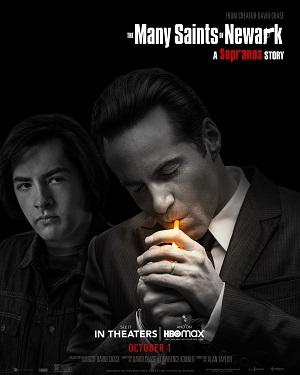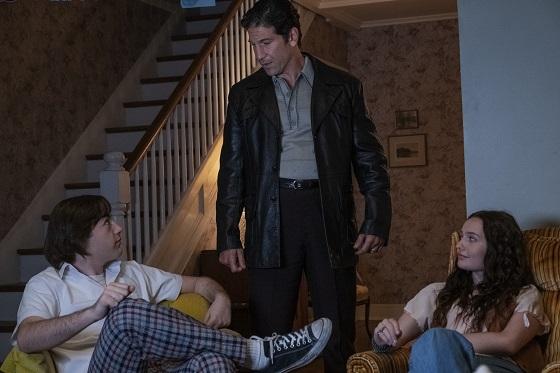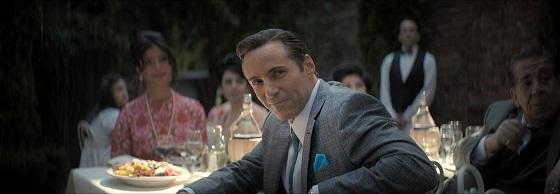

[Rating: Swiss Fist]
In theaters and on HBO Max October 1.
A decent little crime yarn involving younger versions of characters some audience members already know, The Many Saints of Newark is an entirely passable mob flick, average in every way. A prequel to the universally acclaimed T.V. series, The Sopranos, the film by director Alan Taylor (a frequent series contributor) maintains the texture and voice of the groundbreaking show while never achieving its character or story depth. Solid performances and a cozy return to a universe many recognize and love elevate the effort, yet also serve to expose the exceedingly thin connective tissue holding it all together (and the audience to it).
Taylor and the script co-written by series creator David Chase move the story through its paces efficiently through the first act, setting things in 1967 Newark where pre-teen Tony Soprano (William Ludwig) grows up under the wing of his uncle, mob soldier Dickie Moltisanti (Alessandro Nivola), while Tony’s dad, Johnny (Jon Bernthal), is in prison. Those coming to The Many Saints of Newark hoping for a straight-up Tony Soprano prequel will be disappointed, however, as the movie is primarily concerned with Dickie, and the conflict that arises when the elder Moltisanti, Hollywood Dick (Ray Liotta), returns to New Jersey with a young Italian bride, Giuseppina (Michela De Rossi). It’s a tough wrinkle for Dickie, who has more than enough on his plate looking after his impressionable nephew while dealing with the growing unease of his African American business partner, Harold (Leslie Odom Jr.), who is hoping to stop running numbers for Dickie so he can maybe set up his own book.
No spoilers, but crazy shit happens, people die, others do the killing, and general mafia shenanigans ensue. If the television show taught viewers anything, though, it’s that violence and rash action only solve problems for a time, and after the movie jumps ahead a few years (upgrading the Tony role with actor Michael Gandolfini), problems persist for Dickie. It’s this second act and beginning of the third where most of the best series call-back occur, with characters from the show popping in and out of the main narrative drama to seed things with Easter Eggs. These moments act as detours at times, yet fans of the show certainly won’t mind, especially whenever Vera Farmiga is on-screen and breathing life back into the chilling visage of Livia Soprano (it’s the best performance of the film by a mile).

This movie doesn’t lollygag, though, nor does it screw around with its story developments: stacking murder, torture, adultery, and arson eye-high. Things that might have taken a season to unfold in the series happen in the 1st act, and shocking twists that were once the result of a multi-season arc come in waves during the final half hour. Yet as riveting and interesting as Nivola is in the lead, there’s just not enough time with Dickie to make any of this particularly noteworthy.
In the T.V. series, when Tony confronted Ralphie in “Whoever Did This” (S4e9), there was almost twenty hours of dramatic tension built up between the two that boiled over in sudden, spectacular fashion. Likewise, when Tony and Carmela finally had it out in “Whitecaps” (S4e13), the scene cashed in chips buried in the margins of episodes years in the past, revealing startling layers of trauma between the two. The drama of the show was a living, evolving creature that took multiple seasons to sprout and flower, leading to volcanic eruptions of physical and emotional violence that didn’t just feel earned, but necessary: like the draining of a wound.
And while there are plenty of “oh shit” moments in The Many Saints of Newark, this absence of long-form story telling leaves them mostly toothless. Conversely, because the audience knows young Tony so well, every scene with him feels like a gift that reads infinitely deeper than what’s on the surface. Yet this is not Tony Soprano’s story, it is Dickie’s, and the film can never quite find enough dramatic purchase with him and his drama to give viewers the cathartic release the film’s set-piece moments are searching for.

Which doesn’t make the movie bad, per se, just not on the same level cinematically as the companion show was for its medium. Even so, the script leans on a few series callbacks for more than just chuckles, like in the way it deploys Junior Soprano (Corey Stoll) and Silvio Dante (John Magaro) into the machinery of the larger story, yet this is as close as the film ever comes to incorporating vital, long-form elements of the series into the DNA of the new story’s code. Interesting as it may be at times (and fun for fans of the original series), none of it feels directly wired into Dickie’s A-plots involving Harold and Giuseppina, which consequently feel under-baked.
In the end, there’s just not enough Sopranos (TV series) here to satiate fans of the show looking for multi-season character insight, and even less in the way of fresh, interesting mafia drama to satisfy those who have come to except the best of that genre from this brand. This doesn’t result from a lack of interesting characters and situations, but more from the paucity of time offered to allow what’s there to develop. It would be like a person who saw the first thirty episodes of the show, then got dropped into the middle of a storyline four seasons ahead. It is familiar and fun on the face of things, like any mob drama, yet the richness of character and place born out of long-form storytelling are gone. Again, it’s not a bad time, it’s just not quite what Sopranos fans have come to expect from a world that made all of this so uniquely spectacular.





Comments on this entry are closed.